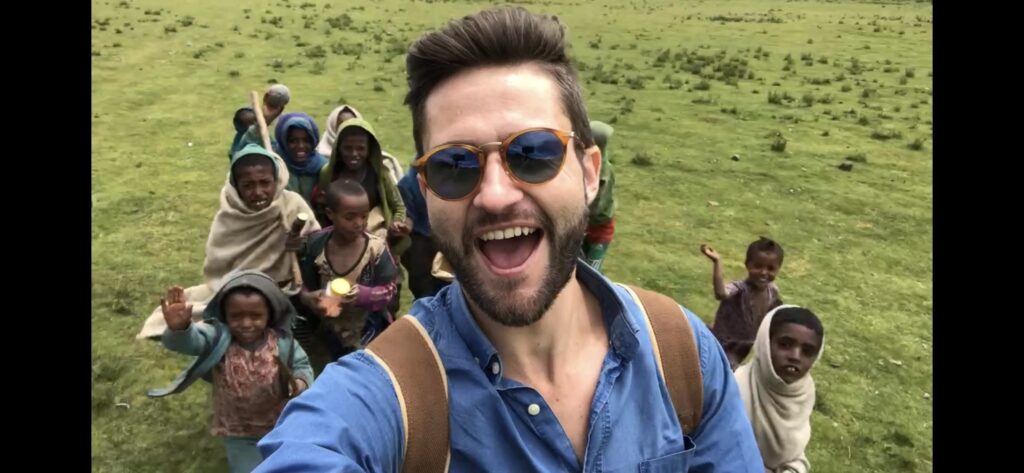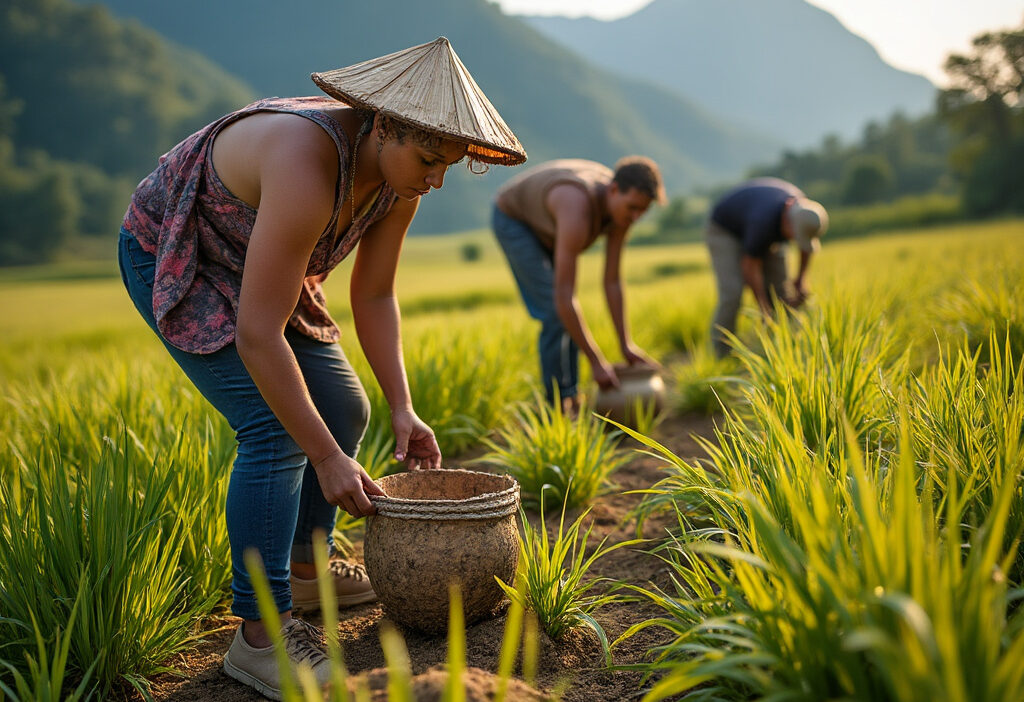Rural Upskilling Adventures: Learning While Traveling
Rural upskilling emerges as a transformative practice, marrying skills development with rural travel experiences to benefit both travelers and local communities. This innovative approach fosters sustainable development and cultural immersion, offering a unique perspective on rural life and its myriad opportunities for learning and growth.
What is Rural Upskilling?
Rural upskilling adventures represent a transformative shift in how education and travel intersect, offering immersive learning experiences that go beyond traditional classroom settings. Unlike conventional skills development, which often focuses on urban-centric or standardized curricula, rural upskilling is deeply rooted in local contexts. It blends traditional wisdom with modern innovation, creating a dynamic learning environment where participants gain hands-on expertise while contributing to community resilience.
At its core, rural upskilling is about place-based learning. Travelers engage directly with local artisans, farmers, and tech adopters, mastering skills like organic farming, renewable energy installation, or digital marketing—all tailored to rural economies. For example, a visitor might learn centuries-old weaving techniques while also discovering how e-commerce platforms can globalize these crafts. This dual approach ensures that knowledge isn’t just acquired but contextualized, bridging gaps between heritage and progress.
What sets rural upskilling apart is its reciprocal impact. Unlike passive tourism or isolated workshops, these adventures foster two-way exchanges. Locals share indigenous knowledge, while travelers bring fresh perspectives, tech literacy, or market access. This synergy strengthens rural ecosystems, making them more adaptable to challenges like climate change or digital divides.
Moreover, rural upskilling prioritizes sustainability. Skills taught aren’t just for individual benefit but are designed to bolster community-wide resilience—whether through agroecology practices that restore soil health or coding bootcamps that empower youth to launch remote businesses. By embedding learning in real-world challenges, these adventures turn travelers into temporary collaborators in rural development, leaving skills—not just footprints—behind.
This model redefines education as a journey, where every destination becomes a classroom and every local expert, a teacher. The result? A growing movement where travel isn’t just about seeing places but transforming them—and oneself—along the way.
The Growing Appeal of Rural Upskilling Adventures
The allure of rural upskilling adventures is growing rapidly, fueled by a convergence of societal shifts and economic imperatives. Sustainable tourism plays a pivotal role, as travelers increasingly seek meaningful experiences that minimize environmental impact while fostering genuine connections with local cultures. Unlike traditional vacations, these adventures prioritize skill acquisition alongside exploration, allowing participants to immerse themselves in rural life while learning everything from organic farming to renewable energy installation.
Another key driver is the pursuit of authenticity. Urban dwellers, fatigued by digital saturation and homogenized cityscapes, crave hands-on engagement with heritage crafts, agroecology, and community-led innovation. Rural upskilling adventures satisfy this demand by offering structured yet flexible learning opportunities, often facilitated by local experts. This not only enriches travelers but also revitalizes rural economies by creating alternative income streams beyond agriculture.
The mutual benefits are undeniable. For travelers, these experiences foster personal growth, equipping them with practical skills and a deeper appreciation for sustainable living. For rural communities, they bring economic diversification and knowledge exchange. When visitors learn traditional weaving or regenerative farming techniques, they help preserve indigenous knowledge while injecting capital into local businesses. Additionally, digital nomads participating in these programs often contribute tech expertise, bridging gaps in rural digital literacy.
The rise of remote work has further accelerated this trend, as professionals combine travel with skill-building in idyllic rural settings. By aligning with global movements like slow tourism and the circular economy, rural upskilling adventures are redefining how education, travel, and community development intersect—proving that learning on the road can be as transformative for places as it is for people.
Models and Examples of Rural Upskilling Initiatives
Rural upskilling initiatives are taking diverse forms, blending education, travel, and community impact. One standout model is educational tourism programs, where travelers engage in hands-on learning while contributing to local projects. For example, in Portugal’s Alentejo region, visitors participate in agroecology workshops, learning sustainable farming techniques while helping smallholders transition to organic practices. These programs not only upskill participants but also inject knowledge and revenue into rural economies.
Another approach is collaborative industry partnerships, where businesses and local communities co-create training programs. In Scotland, the Highlands and Islands Enterprise partners with renewable energy firms to offer wind turbine maintenance courses for rural residents. This equips locals with in-demand green skills while addressing labor shortages in the sector. Similarly, in Vermont, USA, a partnership between craft breweries and agricultural schools teaches sustainable brewing and hop farming, revitalizing both tourism and local agriculture.
Digital nomad upskilling hubs are also gaining traction, blending remote work with skill-sharing. Estonia’s e-Residency program, for instance, attracts tech professionals to rural areas, where they mentor locals in digital entrepreneurship. Meanwhile, in Colombia’s Coffee Axis, co-living spaces host coding bootcamps for travelers and residents alike, fostering tech talent in agrarian communities.
Lastly, cultural immersion programs focus on preserving traditional crafts while modernizing them for new markets. In Japan’s Satoyama Initiative, travelers learn ancient forestry techniques alongside eco-tourism management, ensuring these skills endure while creating sustainable livelihoods.
These models prove that rural upskilling isn’t just about education—it’s about creating ecosystems where learning, travel, and community transformation intersect. By integrating green skills and local partnerships, these initiatives lay the groundwork for the next chapter: the rise of the green economy in rural spaces.
The Green Economy Connection
The shift toward a green economy is reshaping rural upskilling adventures, with a growing emphasis on equipping learners with skills that align with sustainability and environmental stewardship. Programs now integrate renewable energy training, such as solar panel installation and wind turbine maintenance, empowering rural youth to become key players in the energy transition. These skills not only open local job opportunities but also foster entrepreneurship, as participants often launch clean energy ventures in their communities.
Sustainable agriculture is another cornerstone, blending traditional knowledge with modern techniques like permaculture, agroforestry, and organic farming. Travelers engaged in these programs learn to cultivate resilient food systems while reducing environmental impact. This hands-on training strengthens rural economies by promoting climate-smart practices that enhance productivity and biodiversity.
Eco-tourism initiatives further bridge education and sustainability, teaching participants how to develop low-impact tourism models that preserve natural and cultural heritage. From building eco-lodges to guiding wildlife tours, these programs create livelihoods rooted in conservation. By merging travel with green skills training, rural upskilling adventures cultivate a new generation of environmental entrepreneurs who drive local change while addressing global challenges.
The focus on green skills ensures that rural communities aren’t just passive recipients of knowledge but active contributors to a sustainable future. As travelers immerse themselves in these practices, they leave behind not just footprints but lasting investments in the places they visit—transforming rural landscapes into hubs of innovation and ecological resilience.
Benefits of Rural Upskilling Adventures
Rural upskilling adventures offer a unique blend of education, travel, and community impact, creating transformative experiences for participants and host regions alike. These programs go beyond traditional learning by embedding skill development within the cultural and economic fabric of rural areas. Participants not only acquire practical skills but also gain a deeper understanding of local traditions, fostering mutual respect and cross-cultural exchange.
One of the most significant benefits is cultural immersion. Unlike conventional tourism, upskilling adventures encourage meaningful interactions with local artisans, farmers, and entrepreneurs. Learning traditional crafts, sustainable farming techniques, or renewable energy practices directly from community members preserves indigenous knowledge while equipping travelers with valuable competencies. This exchange strengthens social bonds and challenges stereotypes, creating a more inclusive global perspective.
For rural communities, these initiatives provide economic sustenance. By attracting participants who pay for lodging, food, and workshops, upskilling adventures inject capital into local economies. Additionally, they create opportunities for rural residents to monetize their expertise, whether through teaching pottery, guiding eco-tours, or demonstrating agroforestry methods. This model reduces urban migration by validating rural livelihoods as viable and dignified.
Skill acquisition is another cornerstone. Participants leave with tangible abilities, from building solar panels to mastering organic farming—skills that align with the green economy discussed earlier. These competencies empower individuals to implement sustainable practices in their own communities, amplifying the program’s impact beyond the immediate locale.
Ultimately, rural upskilling adventures bridge gaps—between urban and rural, tradition and innovation, learning and doing. They prove that education can be adventurous, and travel can be transformative, benefiting both wanderers and the communities they visit.
Challenges and Solutions in Rural Upskilling
Implementing rural upskilling adventures presents unique challenges, often rooted in the very characteristics that make these regions distinct. Infrastructure limitations, such as unreliable internet connectivity and inadequate transportation, hinder access to digital learning tools and physical mobility for both participants and educators. Additionally, skill mismatches arise when training programs fail to align with the actual needs of rural economies, leading to underutilized talent or migration to urban areas.
To address connectivity gaps, offline-first digital solutions can be deployed, allowing learners to download course materials when internet access is available and study without constant connectivity. Mobile learning platforms optimized for low bandwidth can further bridge this divide. For transportation challenges, community learning hubs—local centers equipped with technology and staffed by trained facilitators—can reduce travel burdens while fostering peer-to-peer learning.
Skill mismatches require a participatory approach, where rural communities co-design curricula based on local economic opportunities, such as agro-tourism, artisanal crafts, or renewable energy projects. Partnerships with local businesses ensure training translates into tangible employment. Micro-credentialing can also validate acquired skills, making them recognizable beyond the community.
Finally, cultural sensitivity is key. Programs must respect traditional knowledge while introducing modern skills, avoiding a top-down imposition of urban-centric models. By integrating digital tools with community-driven strategies, rural upskilling adventures can transform challenges into opportunities for sustainable growth, setting the stage for the impactful case studies explored in the next chapter.
Case Studies: Impactful Rural Upskilling Programs
Here’s the text for the chapter:
Rural upskilling programs are proving transformative across the globe, blending education with immersive travel experiences to empower communities. One standout example is India’s Barefoot College, which trains rural women—often with little formal education—to become solar engineers. The program’s success lies in its hands-on, peer-to-peer learning model, where participants from different regions share knowledge while living and working together. Challenges like language barriers and low literacy were overcome by prioritizing visual and practical training over textbooks.
In Kenya, the M-Pesa Foundation Academy combines digital literacy with vocational skills, targeting youth in remote areas. By integrating mobile technology and localized curricula, the program ensures skills align with regional job markets. A key lesson? Community involvement—local leaders helped tailor content to cultural needs, boosting engagement.
Peru’s Awamaki Lab offers another compelling case, where travelers and locals collaborate on textile and tourism entrepreneurship. The program’s hybrid model—mixing in-person workshops with online mentorship—bridges gaps in access while preserving traditional crafts. Challenges like internet instability were mitigated by offline learning tools, proving adaptability is critical.
Common success factors include:
- Local partnerships—programs thrive when co-designed with communities.
- Blended learning—combining travel immersion with digital follow-up sustains impact.
- Cultural relevance—skills must align with local economies and traditions.
These case studies highlight how rural upskilling adventures aren’t just about skill transfer—they’re about building resilient, interconnected communities. The next chapter explores how technology further amplifies these efforts.
Role of Technology in Enhancing Rural Upskilling
The integration of technology into rural upskilling adventures has revolutionized how travelers and locals alike acquire new skills. Digital tools bridge the gap between remote locations and global knowledge, enabling immersive learning experiences that were once unimaginable. E-learning platforms like Coursera and Udemy have democratized access to high-quality courses, allowing rural communities to learn everything from coding to sustainable farming techniques. Meanwhile, mobile applications such as Duolingo or Khan Academy provide bite-sized lessons that fit seamlessly into the rhythms of rural life.
One standout innovation is the use of mobile learning hubs—equipped with satellite internet and portable devices—that bring digital classrooms to villages lacking infrastructure. These hubs often feature offline-capable content, ensuring learning continues even in areas with unreliable connectivity. Additionally, AI-driven chatbots and virtual mentors offer personalized guidance, adapting to learners’ paces and needs. For example, farmers in India now use apps like AgriApp to access real-time advice on crop management, blending traditional knowledge with modern tech.
Beyond accessibility, technology enhances engagement. Gamification turns skill-building into an interactive adventure, with apps rewarding progress through badges or leaderboards. Virtual reality (VR) is also making waves, allowing learners to simulate complex tasks—like machinery repair or eco-tourism planning—before applying them in real-world settings.
However, challenges remain, such as digital literacy gaps and the need for localized content. Yet, as seen in the case studies from the previous chapter, tech-enabled upskilling programs are proving scalable and adaptable. Looking ahead, as discussed in the next chapter, advancements in VR and green economy tools will further transform rural learning, making these adventures even more impactful. Technology isn’t just an enabler—it’s the backbone of rural upskilling’s future.
Future Directions for Rural Upskilling Adventures
The future of rural upskilling adventures is poised for transformative growth, driven by emerging technologies and evolving educational paradigms. Virtual and augmented reality (VR/AR) are set to revolutionize immersive learning experiences, allowing participants to engage with rural environments and skills training in entirely new ways. Imagine practicing sustainable farming techniques in a virtual simulation before applying them in real-world rural settings, or using AR to overlay instructional guides while repairing renewable energy infrastructure. These tools will bridge the gap between theory and practice, making learning more interactive and accessible.
Educational partnerships will also play a pivotal role. Universities, NGOs, and local communities are increasingly collaborating to design curricula tailored to rural needs. These partnerships ensure that upskilling programs align with both global trends and local economic demands, such as the green economy. Skills in renewable energy, regenerative agriculture, and eco-tourism will become central, empowering rural communities to thrive in a sustainability-focused world.
Another key trend is the rise of micro-credentialing, where participants earn certifications for specific competencies. This modular approach makes learning more flexible and stackable, enabling individuals to build expertise incrementally. Additionally, gamification elements—like badges and leaderboards—could enhance engagement, turning upskilling into a dynamic, community-driven experience.
Finally, the integration of AI-driven personalized learning will allow programs to adapt to individual progress, ensuring no one is left behind. As these trends converge, rural upskilling adventures will not only transform learners but also revitalize rural economies, creating a ripple effect of innovation and opportunity. The next chapter will guide you on how to become part of this movement.
How to Participate in Rural Upskilling Adventures
Participating in rural upskilling adventures requires thoughtful planning and engagement to ensure a meaningful experience. Here’s a step-by-step guide to help you navigate the process effectively.
1. Research and Identify Programs: Start by exploring organizations or platforms that specialize in rural upskilling and educational travel. Look for programs aligned with your interests—whether it’s sustainable agriculture, digital literacy, or traditional crafts. Websites like Workaway, WWOOF, or local government initiatives often list opportunities.
2. Assess Your Goals and Skills: Determine what you hope to gain—whether it’s learning a new trade, contributing to community development, or simply immersing yourself in rural culture. Be honest about your current skill level to choose a program that matches your abilities while offering room for growth.
3. Prepare Logistically: Rural locations may lack urban amenities, so pack essentials like sturdy footwear, weather-appropriate clothing, and any specialized tools if required. Research local customs and basic language phrases to foster better connections with the community.
4. Engage Actively: Once enrolled, immerse yourself fully. Ask questions, participate in hands-on activities, and collaborate with locals. The more you engage, the richer your learning experience will be.
5. Document and Reflect: Keep a journal or digital log to track your progress and insights. Sharing your experiences on blogs or social media can inspire others and amplify the program’s impact.
By following these steps, you’ll not only acquire valuable skills but also contribute to the sustainable development of rural communities, creating a ripple effect of empowerment and innovation.

Conclusions
Rural upskilling adventures offer a powerful model for sustainable development, blending education with travel to benefit both learners and rural communities. These programs not only provide practical skills and cultural immersion but also contribute to local economies and the preservation of traditional practices, pointing towards a promising future for global sustainable development.



